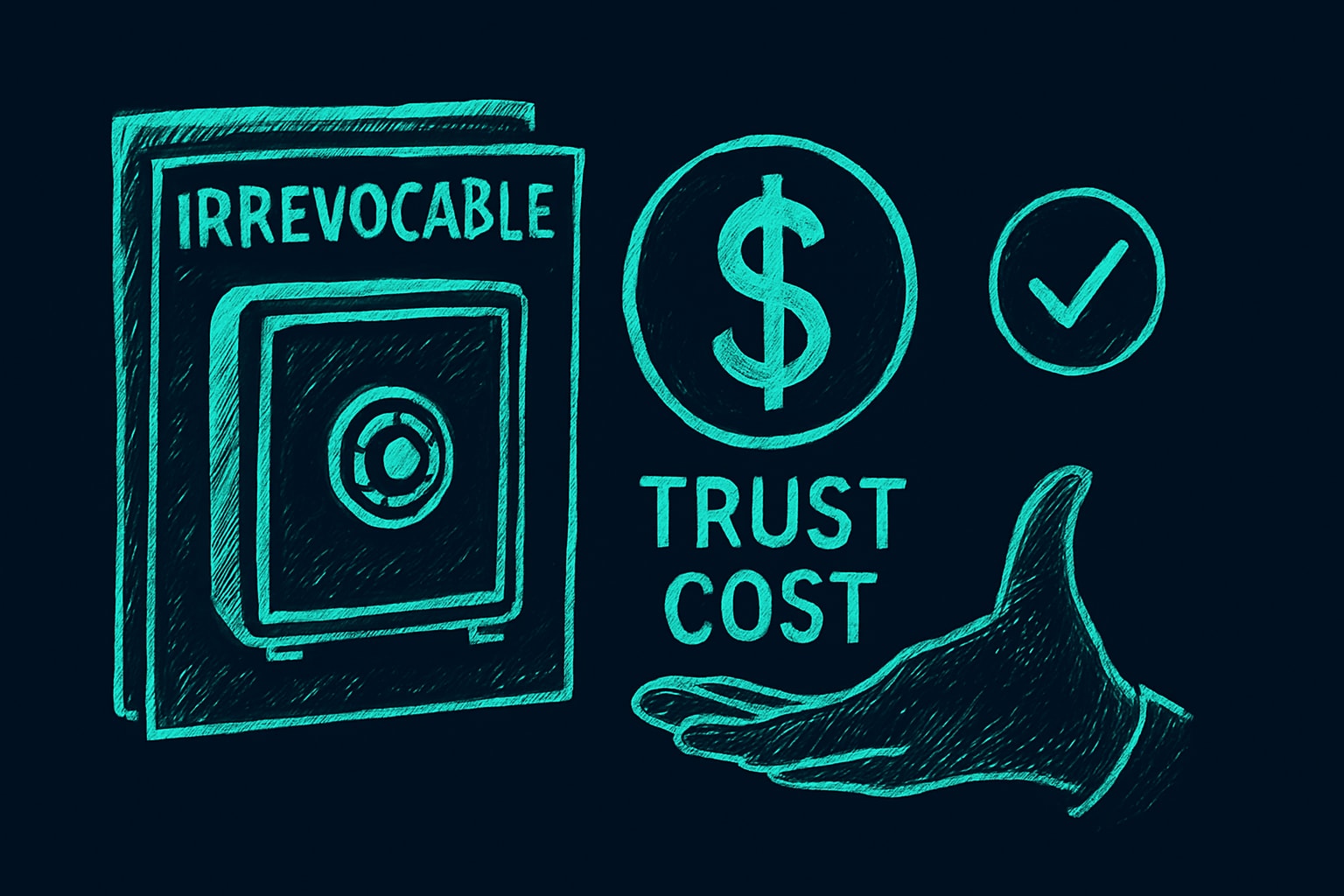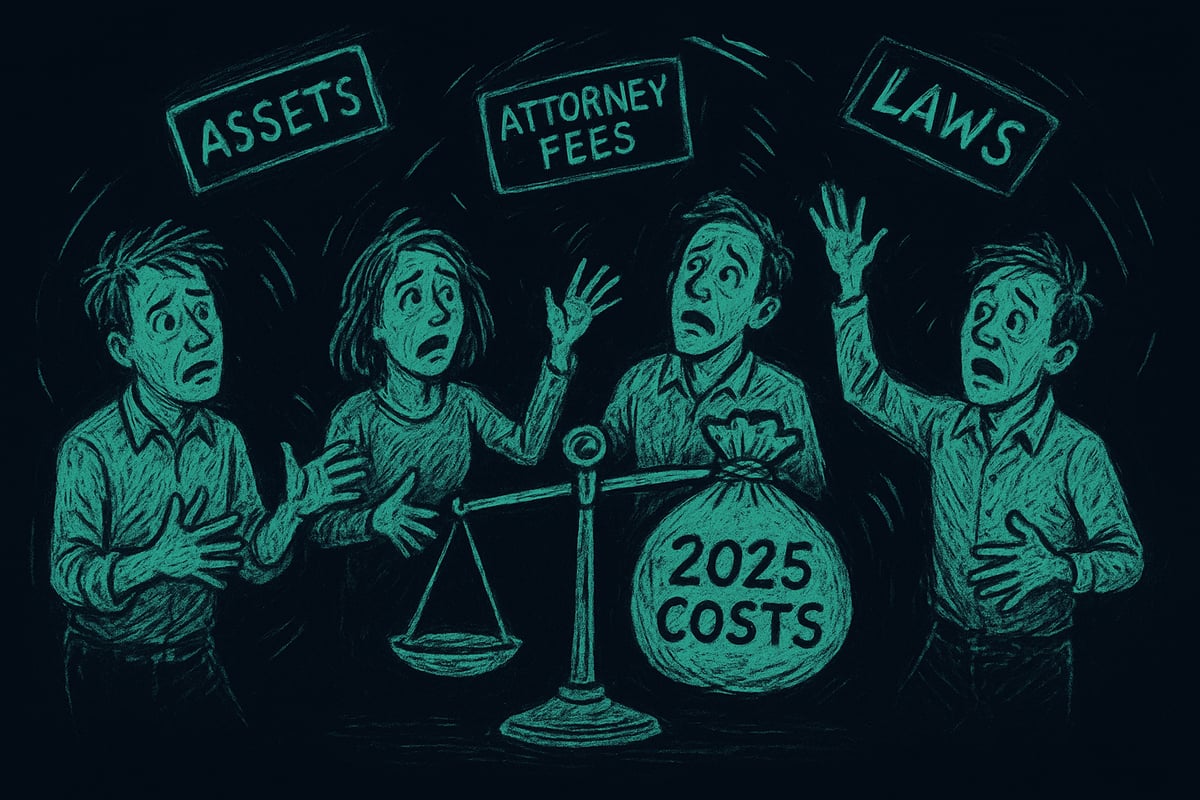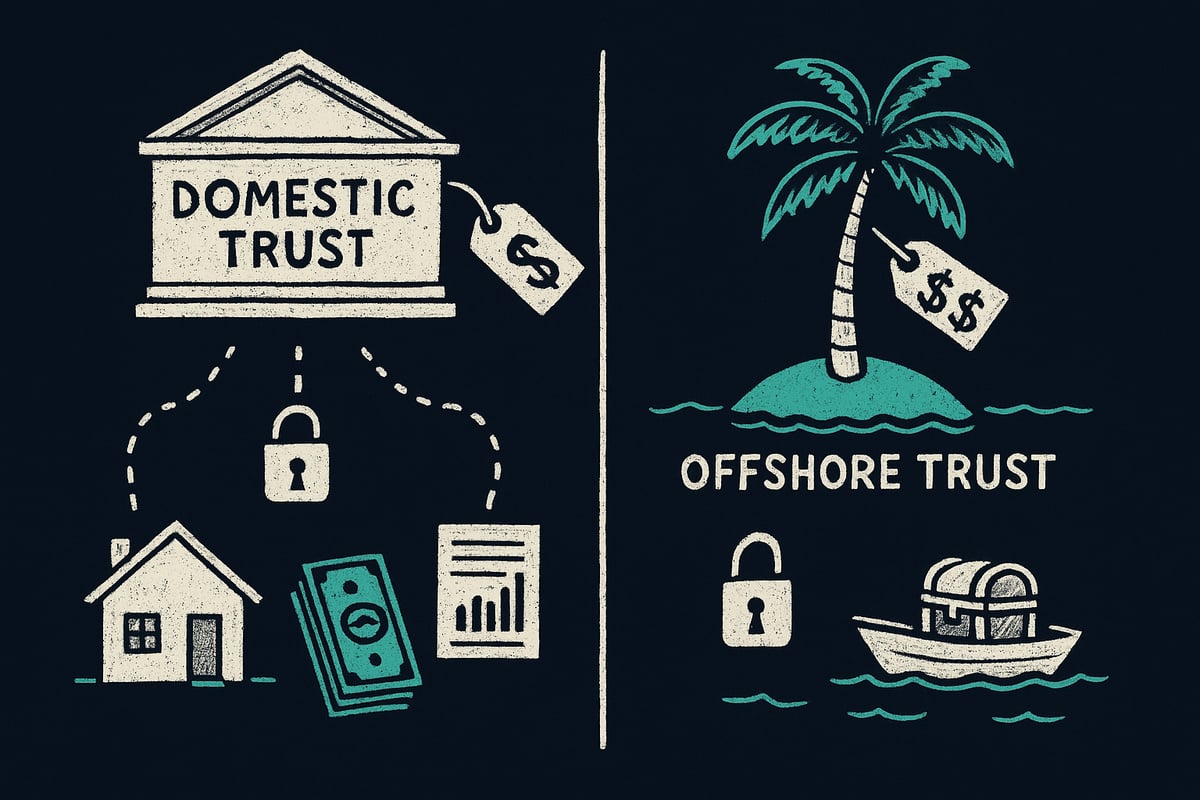Irrevocable Trust Cost Guide: What to Expect in 2025

Thinking about setting up an irrevocable trust in 2025? Congrats, you’re officially more responsible than your neighbor who thinks a will on a napkin will do the trick. The truth is, you’re not alone in wondering about the real irrevocable trust cost. Everyone wants to protect their stuff, but nobody wants to get fleeced by legal fees.
Irrevocable trusts are rising in popularity for asset protection and estate planning. But here’s the fun part: the price tag is a moving target, packed with sneaky variables and surprises. Don’t worry, we’re here to shine a flashlight on every dusty corner of the process.
This guide will break down everything you need to know about irrevocable trust cost in 2025. We’ll cover setup fees, ongoing costs, hidden expenses, and how not to get bamboozled by fine print. Stick around for a full breakdown, smart tips, and a reality check on what’s worth it—and what’s not.
What Is an Irrevocable Trust?
Let’s be honest, nobody wakes up thinking, “I can’t wait to lock away my assets and give up control forever.” Yet here you are, considering an irrevocable trust. Why? Because you’d rather pay the irrevocable trust cost now than watch your hard-earned stuff become a buffet for creditors, exes, or the tax man. Welcome to grown-up estate planning, where control is overrated and privacy is king.

Definition and Key Features
An irrevocable trust is like putting your assets in a vault and tossing the key into the ocean. Once you set it up, you, the grantor, permanently surrender control—no take-backs, no late-night edits. This isn’t your grandma’s revocable trust where you can change your mind on a whim. Here, modifications require either all beneficiary signatures or a court order, so good luck with that.
People use irrevocable trusts for a few unglamorous but essential reasons:
- Shielding assets from lawsuits and creditors
- Minimizing estate taxes (because you love your kids more than the IRS)
- Qualifying for Medicaid without spending your retirement on a nursing home
- Ensuring your legacy isn’t just a cautionary tale
For example, a family might place a business in an irrevocable trust to dodge both creditors and Uncle Sam. High-net-worth individuals and professionals with a target on their back (looking at you, doctors and business owners) tend to pony up the irrevocable trust cost because the protection is simply stronger than what you get from revocable options. Want a detailed comparison? Check out the Pros and Cons of Revocable vs. Irrevocable Trusts in 2025.
How Irrevocable Trusts Work
Here’s the basic cast: the grantor (that’s you), the trustee (your chosen gatekeeper), and the beneficiaries (your greedy, I mean, beloved heirs). Funding the trust means transferring your assets—homes, businesses, life insurance policies—into the trust’s name. Once inside, those assets are out of your legal reach and out of your estate for tax purposes.
There are flavors for every taste, including:
- Irrevocable life insurance trusts (to keep big payouts private)
- Charitable trusts (for those who want their name on a library)
- Special needs trusts (so your vulnerable heirs are cared for, not exploited)
Imagine a physician creating an irrevocable trust to keep personal assets safe from malpractice claims. The cherry on top? Assets in an irrevocable trust skip the probate parade and remain off the public record. Sure, you’re paying the irrevocable trust cost up front and yearly, but you get peace of mind (and a bit of privacy) in return.
Irrevocable Trust Costs in 2025: Full Breakdown
Thinking about the irrevocable trust cost for 2025? Spoiler alert: it’s not pocket change, but it’s also not the financial apocalypse. Let’s break down exactly where your money goes, so you can stop guessing and start planning your death party like a responsible adult.

Setup Costs
Here’s your first reality check: the average irrevocable trust cost to set up in 2025 runs between $1,500 and $6,000. Why the range? Because your “basic” is someone else’s “nightmare asset spreadsheet.” Expect to pay on the low end for simple, single-beneficiary trusts, and on the high side if you’re shoving in a family business, vacation home, or your vintage comic book hoard.
What does that fee actually cover? Drafting the trust documents, initial legal consultations, and tailoring the paperwork to your particular mess of assets. For comparison, revocable trusts are cheaper, typically $1,000 to $3,000, but you don’t get the same bulletproof protection. For a full cost breakdown (with less sarcasm), you can check out How Much Does a Trust Cost? Full Breakdown for 2025.
Legal Fees
Lawyers, because nothing says “fun” like hourly billing. The average attorney charges $200 to $600 per hour for trust work. Want a flat fee? Some lawyers offer packages for basic setups, but if your irrevocable trust cost includes multiple beneficiaries, business interests, or special provisions—like Medicaid planning or caring for your freeloading nephew—expect hourly rates to climb.
Adding complexity, like a special needs trust clause or charitable giving, will pad your bill. If you’re thinking you’ll “just do it online,” remember: every mistake gets paid for, one way or another.
Administrative and Trustee Fees
Congratulations, you’re not done paying yet. The ongoing irrevocable trust cost includes trustee commissions, which run 0.5% to 2% of trust assets per year. That’s $50,000 to $200,000 per year for a $10 million trust. Yes, really.
Professional trustees (think banks and trust companies) charge more but bring expertise—and fewer family feuds at Thanksgiving. Individual trustees (like your cousin Larry) are cheaper, but if Larry can’t spell “fiduciary,” you might regret the savings. Add annual reporting, tax filings, and compliance costs to your trust’s tab.
Asset Transfer and Appraisal Fees
Here’s where the paperwork party gets wild. Transferring real estate, business interests, or your priceless Beanie Baby collection into the trust means extra fees. Real estate appraisals range from $300 to $1,000 per property. Moving mortgages or changing titles? More costs.
Valuable personal property or business interests can add $1,000 or more in legal and appraisal fees. Remember, every asset you toss in the trust comes with its own price tag—because nothing in estate planning is ever truly “free,” except the existential dread.
Maintenance and Miscellaneous Expenses
Annual administrative fees for your irrevocable trust cost run $1,000 to $3,000 for domestic trusts. Offshore? Up to $5,000, plus the price of pretending you understand international tax law. Tax preparation for the trust can add $500 to $2,000 per year, especially if the trust owns multiple assets or spits out income.
Other hidden gems: court petitions if changes are needed, amendments (rare but possible), and the joy of complying with new laws every time Congress gets bored. Make sure you budget for the “surprises,” because estate planning loves a plot twist.
Factors Influencing Irrevocable Trust Costs
So, you want to know why the irrevocable trust cost is all over the place. Spoiler: it’s not just because lawyers charge more the nicer their office carpet is.

Complexity of the Trust
Let’s start simple: the more stuff you have, the more your irrevocable trust cost goes up. If you’re just tossing in a checking account, congrats, you might get away with the bargain bin. But if you’re adding a vacation home, a business, and a “priceless” Beanie Baby collection, expect to pay more.
- More assets = more paperwork = more billable hours.
- Multiple beneficiaries? Each one is a new migraine for your attorney.
- Special provisions (like making sure your nephew doesn’t blow it all in Vegas) need extra drafting.
Bottom line: If your estate looks like a game of Monopoly exploded, your irrevocable trust cost will reflect that.
Geographic Location and Jurisdiction
Where you live (or die) matters. Attorneys in California and New York have higher rates than, say, Wisconsin. Local laws can pile on extra requirements, translating into more hours and a steeper irrevocable trust cost.
Thinking about going offshore? Jurisdictions like the Cook Islands or Belize charge more for setup and maintenance, but they do offer ironclad privacy. For a deep dive into emerging legal and cost trends, check out Private Wealth 2025 - USA: Trends and Developments. Spoiler: costs are not going down.
Choice of Trustee
You could pick your cousin Larry as trustee for a lower irrevocable trust cost, but unless Larry is secretly a financial wizard, you’re playing with fire. Professional trustees (banks, trust companies) charge more, but they tend to know what they’re doing and carry liability insurance.
- Pro: Professionals handle paperwork and compliance.
- Con: They don’t work for free.
- Risk: Cheap family trustees might save money now but cost you later in drama and court fees.
Asset Types, Funding, and Ongoing Needs
If you’re transferring real estate, businesses, or anything that needs an appraisal, add those fees to your irrevocable trust cost. Liquid assets like cash are easier and cheaper to move. The more distributions, tax filings, and hand-holding your trust requires, the higher your annual bills.
Expect costs to creep up in 2025, thanks to inflation and the legal world’s love affair with new regulations. If you think you’re done paying after setup, think again.
Here’s a quick summary:
| Factor | How It Impacts Cost |
|---|---|
| Complexity | More assets = higher cost |
| Location | Big cities, offshore = $$$ |
| Trustee Choice | Pro = higher, DIY = risky |
| Asset Type/Funding | Real estate, business = up |
| Ongoing Needs | More admin = more fees |
Welcome to adulthood. The irrevocable trust cost is your price of entry.
Domestic vs. Offshore Irrevocable Trusts: Cost & Protection Comparison
So, you want to know if your assets should hide out in the USA or take a tropical vacation to the Cook Islands? When it comes to irrevocable trust cost, the decision between domestic and offshore could mean the difference between “mild paperwork headache” and “I need a second passport.” Let’s compare your options before your ex or your creditors do.

Domestic Irrevocable Trusts
Let’s start simple. Domestic irrevocable trusts are the “vanilla” option for those who want protection but aren’t ready to send their money on an international cruise. The average irrevocable trust cost for setup lands between $1,500 and $6,000, with most people paying around $3,000 to $5,000. Annual maintenance is also approachable, usually $1,000 to $3,000.
You’ll get easier access, simpler compliance, and less chance of getting a call from the IRS asking why your cash is sunbathing in Belize. The tradeoff? Compared to offshore, domestic trusts offer less protection from U.S. court judgments. So, if your main concern is your brother-in-law suing you over grandma’s china, domestic might be enough.
Quick Cost Table:
| Type | Setup Cost | Annual Maintenance |
|---|---|---|
| Domestic | $1,500-$6,000 | $1,000-$3,000 |
| Offshore | $3,000-$13,000+ | $2,000-$5,000+ |
Offshore Irrevocable Trusts
Offshore irrevocable trusts are the “James Bond” of asset protection—fancy, expensive, and just a bit mysterious. If you’re worried about lawsuits, creditors, or just want to feel like a villain in a spy movie, offshore might be your move. But be ready for a higher irrevocable trust cost: setup ranges from $3,000 to $13,000 (sometimes more), and annual maintenance can hit $2,000 to $5,000+.
These trusts offer powerful shields against U.S. legal claims, and offshore jurisdictions like the Cook Islands or Belize are famous for tight privacy and short statutes of limitations. But don’t forget, extra legal and compliance hoops await you—think more paperwork, more fees, more “fun.”
Asset Security and Privacy
Now, let’s talk secrecy. Offshore trusts are basically the ninja warriors of privacy. They offer greater confidentiality, making it harder for nosy parties to find out what you own. Domestic trusts, on the other hand, are easier to manage and access, but they’re about as private as your Facebook profile in 2009.
So, what’s your risk profile? If you’re hiding a family business or just don’t trust your third cousin, offshore gives you next-level protection. For most people, a domestic trust’s privacy is probably “good enough”—unless you’re a celebrity or a supervillain.
Legal and Tax Implications
Here’s where the fun really starts. Offshore irrevocable trusts come with extra legal baggage. The IRS wants to know about those faraway assets, so you’ll face mandatory reporting (think Form 3520 and 3520-A). Domestic trusts? Easier, but still not a free ride—expect annual tax filings and compliance costs.
Tax laws change, and if you want the latest scoop on how much Uncle Sam plans to grab in 2025, check out the 2025 Trust Tax Rates: A Comprehensive Guide. Either way, the irrevocable trust cost is more than just dollars—it’s paperwork, time, and yes, a few headaches. But hey, nothing says “I love my heirs” like making sure your assets don’t end up as government souvenirs.
Key Benefits and Drawbacks of Irrevocable Trusts
So, you’re finally thinking about the real cost of dying. Good for you. Don’t worry, an irrevocable trust cost isn’t just a bill—it’s a ticket to a smoother death party for your loved ones. Let’s break down the perks and pitfalls, because nothing says “I love you” like dodging probate and IRS drama.
Benefits of Irrevocable Trusts
Let’s start with why you’d willingly pay the irrevocable trust cost instead of just leaving a sticky note on your fridge. Here’s what you get:
- Asset protection: Creditors, ex-spouses, and lawsuit-happy neighbors can take a hike. The trust acts as a fortress around your stuff.
- Estate tax reduction: If your estate is big enough to make the IRS drool, a trust can legally shrink your taxable wealth. More for your kids, less for Uncle Sam.
- Medicaid planning: Planning to need long-term care? Assets transferred into a trust (five years ahead, please) can help you qualify without burning through everything.
- Privacy: Unlike a will that becomes public gossip, trusts keep your family’s business off the record.
- Favorable tax treatment: Some trust assets or distributions may get a sweeter deal from the tax code.
Example: The Jones family moved their business into a trust. Result? No creditors or tax vultures circling. That irrevocable trust cost? Cheaper than a decade of lawsuits.
Congrats! You’re slightly less irresponsible than you were 10 minutes ago. Turns out, the irrevocable trust cost is a small price for peace of mind.
Drawbacks and Risks
Before you get too excited, let’s drag the skeletons out of the closet. Here’s what might make you cringe about the irrevocable trust cost:
- Loss of control: Once assets are in, you can’t just yank them back. Change your mind? Too late.
- Trustee roulette: Pick a bad trustee, and your heirs might end up starring in a real-life soap opera.
- Ongoing costs: Annual fees, tax filings, and legal updates aren’t free. Think of it as a subscription to not screwing up your legacy.
- Tax headaches: Trusts can get slapped with high tax rates, and the IRS expects paperwork—especially for offshore shenanigans.
- Not for every asset: Retirement accounts and your favorite mug? Leave them out, unless you like penalties.
Remember, an irrevocable trust cost isn’t just what you pay upfront. It’s the price of complexity and long-term commitment.
Who Should Consider an Irrevocable Trust?
Still reading? You might actually need one. The irrevocable trust cost makes sense if you:
- Have an estate so big your kids argue over who gets the vacation home.
- Work in a lawsuit-prone field—doctors, business owners, anyone who’s ever said “I’ll see you in court.”
- Need to protect a family member with special needs, or you’re plotting Medicaid eligibility.
- Want to keep your fortune out of your ex’s hands (and the tabloids).
Bottom line: If you have something worth fighting over, the irrevocable trust cost is your ticket to dying with dignity—and fewer family brawls.
Frequently Asked Questions About Irrevocable Trust Costs
So, you’re finally ready to stop winging it and face the cold, expensive truth about irrevocable trust cost. Good for you. Let’s answer the questions you’re too embarrassed to ask your lawyer (or your mom).
What’s the average total cost to set up and maintain an irrevocable trust?
Brace yourself. The average irrevocable trust cost typically lands between $1,500 and $6,000 for setup. Maintenance? Expect $1,000 to $5,000 or more per year. For a $2 million estate, you might pay $3,500 up front and $2,000 annually. This is the price of adulting so your heirs don’t have to fight it out on Judge Judy.
Are there any hidden or unexpected fees?
Oh, absolutely. The irrevocable trust cost can balloon if you need extra legal help, asset appraisals, or court petitions. Changing trustees or amending the trust (rare, but life happens) also means more cash out the door. If you think you can outsmart the system, the system will laugh and send you another bill.
How do taxes work for irrevocable trusts?
Irrevocable trusts are their own tax creatures. The trust files its own return, and income is often taxed at higher rates than your paycheck. Distributions to beneficiaries might also be taxed. Offshore trusts? The IRS wants a piece, so you’ll probably need to file Form 3520 or 3520-A. You can read more on the IRS website.
Can I use an online service to create an irrevocable trust?
Technically, yes. Should you? Only if you want your heirs to star in a future episode of “Family Feud: Probate Edition.” Online platforms might save money, but they’re risky for anything beyond the most basic irrevocable trust cost scenario. Complex assets or high stakes? Get a real lawyer.
What assets should I avoid putting in an irrevocable trust?
It’s tempting to toss everything in, but don’t. Retirement accounts can trigger taxes or penalties. Everyday checking, savings, and some personal property are better left out. The wrong move could end up costing you more than just the irrevocable trust cost.
How do I choose the right trustee?
Choose wisely. Professional trustees (banks, trust companies) charge more but bring expertise. Aunt Linda might work for cookies, but if she’s clueless, you’re risking your legacy. Weigh cost, trustworthiness, and experience. If you pick the wrong person, your irrevocable trust cost might include family therapy.
How do irrevocable trust costs compare to revocable trusts and wills?
Irrevocable trust cost is the heavyweight champ here—more expensive than revocable trusts and way pricier than a basic will. Wills run $69 to $1,000, revocable trusts $1,000 to $3,000. But you get what you pay for: more protection, fewer family brawls, and a shot at dying slightly less irresponsibly.
So, after all the talk about trust costs, asset protection, and legal fees that make your wallet sweat, let’s get real for a second—you’re going to die. (Sorry, but someone had to say it.) Your family shouldn’t have to wrestle over your stuff or pay a fortune just to keep your legacy intact. If the idea of endless paperwork and “billable hours” makes your soul leave your body early, do something smarter—start with the basics. You can actually make a legally valid will in all 50 states, in about the time it takes to binge a sitcom episode. Start My Will Now
Related Articles You Should Read
What Happens If You Die Without a Will in Tennessee: 2026 Complete Guide
What Happens If You Die Without a Will in Tennessee: 2026 Complete Guide Meta Description: Dying without a will in Te...
What Happens If You Die Without a Will in Pennsylvania: 2026 Guide
What Happens If You Die Without a Will in Pennsylvania: 2026 Guide Meta Description: Die without a will in Pennsylvan...
What Happens If You Die Without a Will in New York: 2026 Complete Guide
What Happens If You Die Without a Will in New York: 2026 Complete Guide Meta Description: Die without a will in New Y...